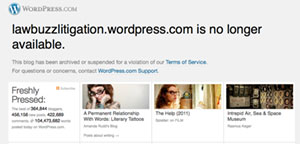An Ontario judge has ordered an anonymous blogger sued by a defendant in the Lawbuzz defamation case to reveal his or her identity.

Tycho Manson, a lawyer with Sun Media Corp. in Toronto, launched the $1-million defamation suit in July last year against the blogger, who ran lawbuzzlitigation.blogspot.com
, and commenters on the site.
The blog, which has since been taken down, had been providing commentary on the protracted dispute between legal forums lawbuzz.ca and advicescene.com. AdviceScene accused four lawyers of making statements it alleged cast doubt on its legitimacy.
Manson himself was
unmasked as one of the defendants in that case after Lawbuzz agreed to turn over registration information as part of its own settlement with AdviceScene.
That suit ended earlier this year with a no-costs dismissal after AdviceScene founder Nancy Kinney “got tired of the whole thing,” but Manson’s separate action has rumbled on in the meantime.
In addition to the identification order, Ontario Superior Court Justice Sarah Pepall’s Aug. 3 decision also allowed service of the blogger via an e-mail address associated with the blog and ordered an interlocutory injunction requiring the blog be taken down and preventing further publication of the allegedly defamatory statements.
In his statement of claim, Manson complained that three posts by the anonymous blogger, taken together with comments attached to them, portrayed him as dishonest and a coward. According to the claim, the blogger also e-mailed Manson’s superiors at Sun Media with links to the blog.
After failing in an attempt to get Google, the blog’s host, to remove the posts, Manson launched the suit and brought a motion against Google. In July 2010, Superior Court Justice Michael Code ordered the search giant to turn over subscriber information about the blog and the Gmail address associated with it.
The original blog has since been removed, but a mirror blog appeared at lawbuzzlitigation.wordpress.com, along with similar comments to those found on the original. Since the order, the mirror blog has been removed by WordPress, replaced with a message that says it violated its terms of service, while the Gmail address identified with the blog no longer exists.
Google’s disclosures revealed posts were being made to the blog from a wireless user at Second Cup coffee shops and the University of Toronto, but the search quickly ran into roadblocks. Google refused to reveal to which e-mail addresses messages to the Gmail account were forwarded, claiming it wasn’t covered by Code’s order, while the University of Toronto said it would be impossible to identify users of its wireless network.
In e-mail messages, the blogger at one stage told Google that he or she was “in the process of retaining counsel.” Despite indicating they were based in the U.S. and claiming not to have received documents from Manson’s lawyers, Pepall said she was satisfied that the blogger was “likely in Ontario,” and validated the service by e-mail.
“I conclude that to the extent he or she has not received the full motion record and the statement of claim, it is due to a deliberate attempt to evade service,” she wrote.
Pepall agreed that the comments on the original blog and the mirror site are prima facie defamatory, and said Manson could face irreparable harm if she failed to grant the inunction he requested.
“For a lawyer, the loss of a good reputation is not reparable by money. The objectionable statements made about Mr. Manson continue to threaten, as they have for more than a year, his reputation as a lawyer,” she said.
Applying the test set out in
Warman v. Fournier for the maintenance of anonymity in a defamation action, Pepall found none of the defendants could have a reasonable expectation of anonymity.
Pepall distinguished the case from a recent one involving commenters on a web site accused of libelling a former mayor of Aurora, Ont. The mayor was unsuccessful in the request for information about the anonymous posters, but Pepall said the competing values present in that case — freedom of expression in the context of political speech — was not at play in Manson’s.
Pepall was also satisfied that a prima facie case had been made, that Manson had made reasonable attempts to identify the blogger on his own, and that the public interest favouring disclosure outweighed the defendants’ right to privacy.
“The defendants can have no reasonable expectation of the protection of their privacy or right to privacy when they are using the Internet to intentionally defame Mr. Manson in his private life and profession. As the Divisional Court noted in Warman, ‘there is no compelling public interest in allowing someone to libel and destroy the reputation of another while hiding behind a cloak of secrecy,’” Pepall wrote.
Pepall gave the blogger until Aug. 12 to identify him or herself and their co-defendants, but on Aug. 17, Manson filed a requisition to note the blogger in default for their failure to deliver a statement of defence in time.
“We haven't yet heard from John Doe No. 1. We're certainly hoping he or she will contact us to indicate his willingness to comply with the court's order, so that it won't be necessary to take further steps to identify him,” Manson said in an e-mail to Law Times last week.
Beyond that, Manson declined comment, saying that Pepall’s decision “speaks for itself, and very clearly.”

 Tycho Manson, a lawyer with Sun Media Corp. in Toronto, launched the $1-million defamation suit in July last year against the blogger, who ran lawbuzzlitigation.blogspot.com, and commenters on the site.
Tycho Manson, a lawyer with Sun Media Corp. in Toronto, launched the $1-million defamation suit in July last year against the blogger, who ran lawbuzzlitigation.blogspot.com, and commenters on the site.